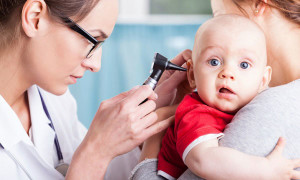Preventing and Treating Middle Ear Infections
Did you know that infants and children are more likely to get middle ear infections after they have caught a virus or a cold? For this reason, it’s especially important to keep an eye out for symptoms in the days that follow.
“A cold, a throat infection or even an allergy attack may set up an ear infection,” explains Craig Wax, DO, an osteopathic family physician practicing in Mullica Hill, New Jersey. “The tubes that connect the middle ear to the throat, called the Eustachian tubes, can become blocked and trap fluid that would normally drain from the middle ear. This buildup can cause discomfort or pain and then becomes a favorable environment for bacteria or viruses to breed.”
Dr. Wax explains that fluid buildup may lead to severe middle ear infections.
Symptoms of Fluid Buildup
“Some common symptoms that can indicate a buildup of inner ear fluid are pressure in the ear or hearing popping or ringing sounds,” explains Dr. Wax. “With younger children, you may notice them rubbing or pulling their ears to relieve the pressure.”
Dr. Wax identifies loss of hearing, balance problems and dizziness as other symptoms of buildup.
Middle Ear Infections
In severe cases, the fluid in the middle ear builds and increases pressure on the eardrum until it ruptures. Once it ruptures, the fluid drains, and the pain usually subsides. The hole in the eardrum will usually heal by itself in a few weeks. However, if the eardrum does not release the fluid trapped within the tubes, a middle ear infection can worsen. Yellow, clear or bloody discharge can mean the eardrum has ruptured. Symptoms of middle ear infections include:
- Mild to severe ear pain
- Fever
- Loss of appetite, vomiting and grumpy behavior
- Sleep issues
- Signs of inattentiveness or absent-mindedness, which can signal hearing loss
“Most patients experience the symptoms of a middle ear infection two to seven days after a cold or respiratory infection,” explains Dr. Wax. “If the symptoms of the infection last longer than a week, you should seek medical attention.”
Ear pain, fever, loss of appetite and sleep issues can all be signs of middle ear infection.
Dr. Wax states that most ear infections get better without treatment. However, he recommends immediately visiting a physician if your child suffers from fluid buildup or middle ear infection symptoms, particularly children younger than three years old.
Preventing Ear Infections
As an osteopathic physician, Dr. Wax offers the following recommendations to prevent ear infections:
- Wash your hands and your child’s hands frequently.
- Do not let babies and toddlers put unclean or inappropriate things in their mouth.
- Avoid smoky environments. Ear infections are more common in people who are around cigarette smoke. Do not allow anyone to smoke in your home or car.
- Breastfeed your baby, if possible. Research indicates that breastfeeding helps reduce the risk of ear infections, particularly among children with a family history of ear infections. However, if breastfeeding is not an option, avoid bottle feeding the baby while he or she is lying down.
- Vaccinate your child. While immunizations do not prevent ear infections directly, they can prevent illnesses like the flu that often lead to ear infections.
- Discontinue use of a pacifier. Babies who use pacifiers after 12 months are more likely to develop ear infections.
